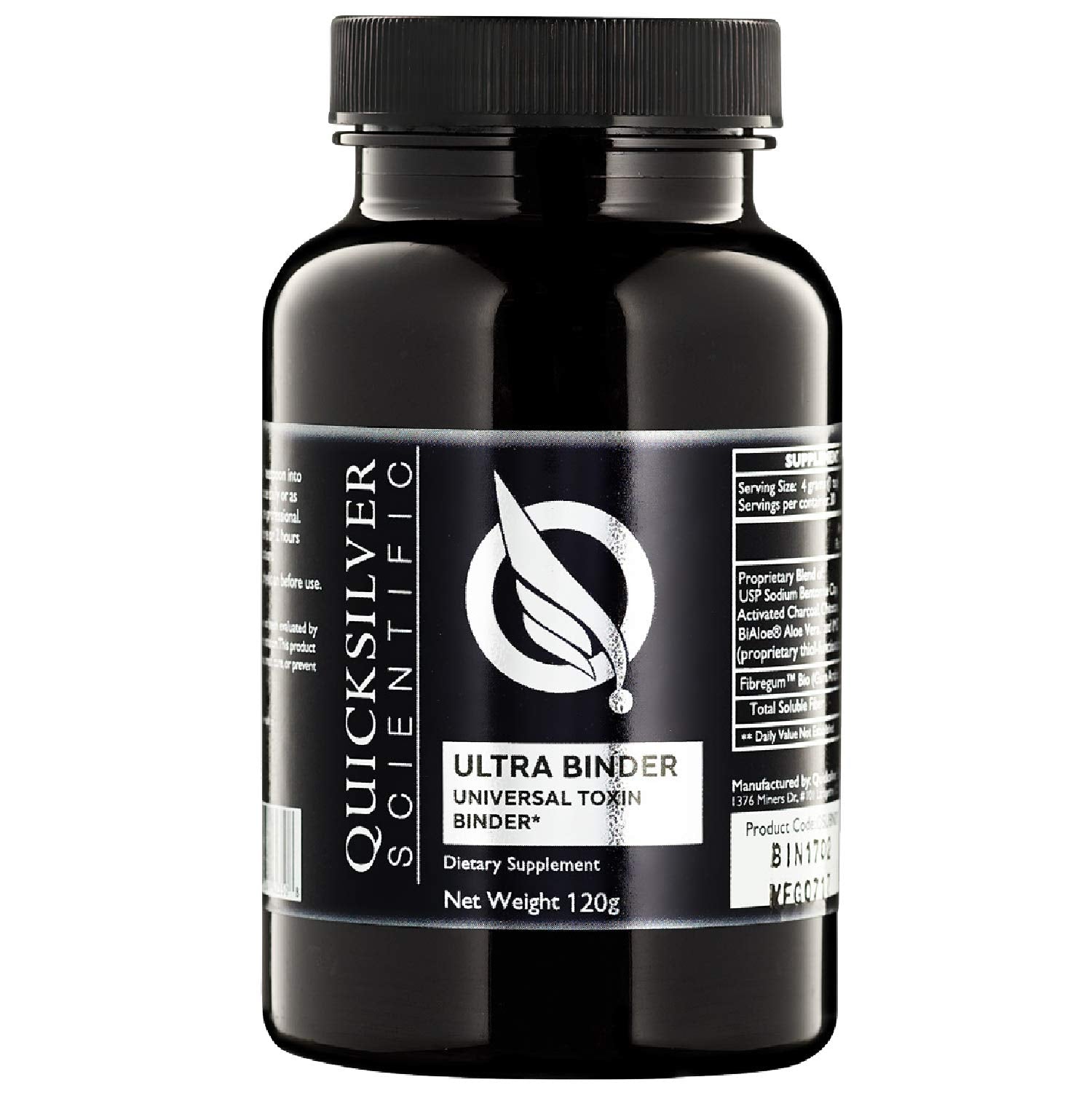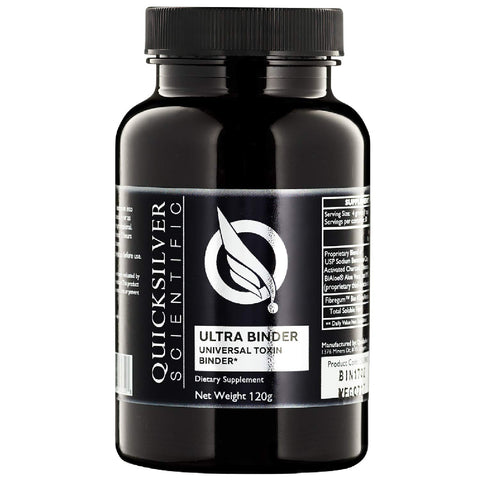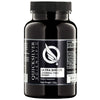- Regular price
- $104.95
- Sale price
- $104.95
- Regular price
-
- Unit price
- per
Ultra Binder? is a universal, broad-spectrum binder blend that captures toxins, optimizes gut health, lowers inflammation, and neutralizes a wide array of harmful substances. This comprehensive formula intercepts and adheres to toxins that the body most commonly encounters ?including heavy metals, pesticides, herbicides, endocrine disrupters, drug residues, food additives, as well as mold and bacterial toxins. The natural ingredients possess a demonstrated ability to function as antioxidants, reduce inflammation, promote healthy immune function, stimulate friendly gut flora, increase mineral absorption, and reduce susceptibility to toxic xenobiotics. They have been shown to bind to and inactivate bacteria, fungi, and viruses. The optimized combination of bentonite clay, activated charcoal, chitosan, and Quicksilver Scientific?s proprietary mercury-binding complex, IMD Intestinal Cleanse, is enhanced with soothing, fluidizing, and mildly laxative acacia gum and aloe vera. Both acacia gum and aloe vera support the health of the intestinal lining, normal gut motility, and the growth of friendly flora. Ultra Binder?, with its one-of-a-kind formulation, acts like an extra organ of detoxification, enhancing homeostasis and preventing free radical generation.
Applications & Benefits:
? Assists detoxification
? Anti-inflammatory
? Antimicrobial
? Boosts friendly flora
? Sequesters endotoxins
? Captures mercury and heavy metals
? Immunomodulation
? CIRS (chronic inflammatory response syndrome)
? Increases gut motility
? Tissue repair
? High cholesterol
Suggested Use:
Mix 1 rounded teaspoon into 8 ounces of water once daily or as directed by healthcare professional. Take 30 minutes before or 2 hours after meals or medications. If pregnant, consult a physician before use.
Endotoxin: An Overlooked Cause of Inflammation and Impaired Detoxification
Eighty percent of our immune system is located in the gut. Of particular concern in the gut and systemic health is endotoxin, a lipopolysaccharide component of the cell wall of numerous gram-negative bacteria. Endotoxin-producing gram-negative bacteria can populate the intestinal tract, the urinary tract, and the jaw in chronic infections. In small amounts, endotoxins are tolerated, but when intestinal flora is imbalanced and the gut wall is inflamed, tight junctions become leaky. Large amounts of endotoxins can then be released and slip into systemic circulation where they can become aggressively pro-inflammatory.
The inflammation from endotoxins shut down key detoxification transporters and enzymes in the liver that normally prevent bacterial and dietary antigens from entering the systemic circulation. This ongoing inflammation further increases susceptibility to toxins and xenobiotics. Binders?which increase enterosorption?are therefore a key strategy in downregulating inflammation and facilitating detoxification, both on a daily basis and in more intensive, focused regimens. In fact, according to animal research, enterosorption increases general detoxification capacity and even results in a marked increase in lifespan. However, an array of toxins must be captured for true enterosorption, and different natural binders have different affinities and capacities. The innovative blend in Ultra Binder? offers comprehensive coverage.
Activated Charcoal: A Universal Antidote
Ultrafine, activated charcoal contains millions of tiny pores that capture and remove positively charged toxins in the gastrointestinal tract, and thus charcoal has long been considered a universal antidote for acute and chronic poisoning. Charcoal is effective at removing metals, bacterial endotoxins, plant toxins and alkaloids, pharmaceuticals, and gasses and vapors, among other substances. Activated charcoal also binds and adsorbs bile salts, which accounts for its capacity to lower cholesterol. Charcoal?s adsorbent properties have the ability to spare the kidneys by binding to urinary toxins such as urea and indoxyl sulfate, limiting kidney damage. Charcoal is well tolerated and easily excreted in the feces.
Chitosan: A powerful Binder That Supports Friendly Flora and Immune Function
Chitosan is a water-soluble polysaccharide derived from the hard outer skeleton of shellfish; the long-chain sugar is devoid of allergens and has been extensively studied for its ability to lower cholesterol, including LDL, and reduce obesity. Chitosan is polyfunctional and binds metals and microbes. The positive charge of chitosan oligosaccharides binds with negatively charged microbial cell membranes, accounting for its antimicrobial and antifungal properties. It also supports friendly flora such as bifidobacteria and lactobacilli and may help reduce obesity by reducing phylum firmicutes (associated with weight gain). It is immunostimulatory and anti-inflammatory. Chitosan oligosaccharides improve the function of antioxidant enzymes such as superoxide dismutase (SOD) and catalase (CAT) and have been shown to support immune function as well, increasing molecules such as IL-6, TNF-a, and IgG. Chitosan is particularly useful in addressing chronic inflammatory response syndrome (CIRS), which is often activated by conjugated toxins from mold and algae and has been extensively described by Ritchie Shoemaker, MD.
Bentonite Clay: A Broad-Spectrum Antimicrobial Binder That Aids Digestion
Bentonite clay made from volcanic ash known as ?Montmorillonite? is a creamy grey color with an extremely soft and fine consistency. Due to the small particle size, bentonite clay has a vast surface area capable of binding to multiple harmful substances. Clay has extraordinary adsorptive properties and is rich in minerals, including silica, magnesium, sodium, calcium, iron, and potassium. Clay is a broad-spectrum antimicrobial that binds mold toxins, heavy metals, microbes, and various chemicals. Clay has been shown to specifically bind endotoxins and lipopolysaccharides.
IMD Intestinal Cleanse: Natural Elimination of Metals Through the Intestines
Intestinal Metals Detox (IMD) is proprietary thiol-functionalized silica that delivers insoluble thiol groups to bind and eliminate mercury and other heavy metals accumulated in the intestines, as well as quenching free radicals. IMD?s actions enhance Phase III Detoxification, the final system of transporters leading out of the body. IMD consists of highly purified silica with covalently attached thiolic metal-binding groups. Both the silica base and the binding agents are GRAS (Generally Recognized as Safe) for use in food. The specific chemistry of the compound has several benefits over other detoxification remedies, and the active binding groups out-compete other compounds for metals in the intestines.
IMD does not enter the bloodstream, and thus will not lead to redistribution or surges of mobilized metals that can potentially lead to kidney/liver overload. IMD intercepts methylmercury and other metals trapped in enterohepatic circulation, binding them and escorting them out of the intestines. Doing so, allows organ and tissue-bound mercury to safely drain into the blood at a natural rate. The local action of quenching free radicals and elimination of metals supports intestinal health as both of these factors can contribute to intestinal inflammation. This is particularly significant with mercury from corroding dental amalgams or dietary sources, for example, the corrosion of amalgam mercury results in mercuric mercury (HgII, also called inorganic mercury) release. When swallowed with saliva, HgII can slow detoxifying transport proteins, and cause intestinal inflammation that further impedes detoxification. The continuous removal of metals is critical for a successful practitioner-directed detoxification program.
Aloe Vera and Acacia Gum: Soluble, Fluidizing Substances to Improve Gut Motility and Health
Aloe vera contains a glucose-rich, mannose-containing oligosaccharide called acemannen that is soothing to gastric mucosa, normalizes gastric flora, and supports the immune system and tissue repair. Aloe also contains other polysaccharides and phenols that function as antioxidants and reduce side effects of constipation normally associated with binders.
Acacia gum has a long history of use in normalizing gut motility and function. It is packed with soluble fiber?95% and offers unique benefits. Daily consumption of soluble fiber has been shown to increase levels of beneficial gut bacteria, support healthy cholesterol levels, soothe sensitive stomachs, help normalize gut transit time and both ease constipation and improve diarrhea, as well as have a beneficial effect on blood sugar, blood pressure, and weight. Many of these benefits are correlated with the ability of the soluble fiber, such as acacia, to attract water and form a soothing gel. Fermentation of acacia gum in the gut by resident flora yields health-promoting metabolites such as short-chain fatty acids, which can stimulate the growth of lactic acid bacteria (lactobacilli and bifidobacteria). Acacia gum improves leaky gut and gut barrier function and is well tolerated even at higher doses.
Ultra Binder? is a universal, broad-spectrum binder blend that captures toxins, optimizes gut health, lowers inflammation, and neutralizes a wide array of harmful substances. This comprehensive formula intercepts and adheres to toxins that the body most commonly encounters ?including heavy metals, pesticides, herbicides, endocrine disrupters, drug residues, food additives, as well as mold and bacterial toxins. The natural ingredients possess a demonstrated ability to function as antioxidants, reduce inflammation, promote healthy immune function, stimulate friendly gut flora, increase mineral absorption, and reduce susceptibility to toxic xenobiotics. They have been shown to bind to and inactivate bacteria, fungi, and viruses. The optimized combination of bentonite clay, activated charcoal, chitosan, and Quicksilver Scientific?s proprietary mercury-binding complex, IMD Intestinal Cleanse, is enhanced with soothing, fluidizing, and mildly laxative acacia gum and aloe vera. Both acacia gum and aloe vera support the health of the intestinal lining, normal gut motility, and the growth of friendly flora. Ultra Binder?, with its one-of-a-kind formulation, acts like an extra organ of detoxification, enhancing homeostasis and preventing free radical generation.
Applications & Benefits:
? Assists detoxification
? Anti-inflammatory
? Antimicrobial
? Boosts friendly flora
? Sequesters endotoxins
? Captures mercury and heavy metals
? Immunomodulation
? CIRS (chronic inflammatory response syndrome)
? Increases gut motility
? Tissue repair
? High cholesterol
Suggested Use:
Mix 1 rounded teaspoon into 8 ounces of water once daily or as directed by healthcare professional. Take 30 minutes before or 2 hours after meals or medications. If pregnant, consult a physician before use.
Endotoxin: An Overlooked Cause of Inflammation and Impaired Detoxification
Eighty percent of our immune system is located in the gut. Of particular concern in the gut and systemic health is endotoxin, a lipopolysaccharide component of the cell wall of numerous gram-negative bacteria. Endotoxin-producing gram-negative bacteria can populate the intestinal tract, the urinary tract, and the jaw in chronic infections. In small amounts, endotoxins are tolerated, but when intestinal flora is imbalanced and the gut wall is inflamed, tight junctions become leaky. Large amounts of endotoxins can then be released and slip into systemic circulation where they can become aggressively pro-inflammatory.
The inflammation from endotoxins shut down key detoxification transporters and enzymes in the liver that normally prevent bacterial and dietary antigens from entering the systemic circulation. This ongoing inflammation further increases susceptibility to toxins and xenobiotics. Binders?which increase enterosorption?are therefore a key strategy in downregulating inflammation and facilitating detoxification, both on a daily basis and in more intensive, focused regimens. In fact, according to animal research, enterosorption increases general detoxification capacity and even results in a marked increase in lifespan. However, an array of toxins must be captured for true enterosorption, and different natural binders have different affinities and capacities. The innovative blend in Ultra Binder? offers comprehensive coverage.
Activated Charcoal: A Universal Antidote
Ultrafine, activated charcoal contains millions of tiny pores that capture and remove positively charged toxins in the gastrointestinal tract, and thus charcoal has long been considered a universal antidote for acute and chronic poisoning. Charcoal is effective at removing metals, bacterial endotoxins, plant toxins and alkaloids, pharmaceuticals, and gasses and vapors, among other substances. Activated charcoal also binds and adsorbs bile salts, which accounts for its capacity to lower cholesterol. Charcoal?s adsorbent properties have the ability to spare the kidneys by binding to urinary toxins such as urea and indoxyl sulfate, limiting kidney damage. Charcoal is well tolerated and easily excreted in the feces.
Chitosan: A powerful Binder That Supports Friendly Flora and Immune Function
Chitosan is a water-soluble polysaccharide derived from the hard outer skeleton of shellfish; the long-chain sugar is devoid of allergens and has been extensively studied for its ability to lower cholesterol, including LDL, and reduce obesity. Chitosan is polyfunctional and binds metals and microbes. The positive charge of chitosan oligosaccharides binds with negatively charged microbial cell membranes, accounting for its antimicrobial and antifungal properties. It also supports friendly flora such as bifidobacteria and lactobacilli and may help reduce obesity by reducing phylum firmicutes (associated with weight gain). It is immunostimulatory and anti-inflammatory. Chitosan oligosaccharides improve the function of antioxidant enzymes such as superoxide dismutase (SOD) and catalase (CAT) and have been shown to support immune function as well, increasing molecules such as IL-6, TNF-a, and IgG. Chitosan is particularly useful in addressing chronic inflammatory response syndrome (CIRS), which is often activated by conjugated toxins from mold and algae and has been extensively described by Ritchie Shoemaker, MD.
Bentonite Clay: A Broad-Spectrum Antimicrobial Binder That Aids Digestion
Bentonite clay made from volcanic ash known as ?Montmorillonite? is a creamy grey color with an extremely soft and fine consistency. Due to the small particle size, bentonite clay has a vast surface area capable of binding to multiple harmful substances. Clay has extraordinary adsorptive properties and is rich in minerals, including silica, magnesium, sodium, calcium, iron, and potassium. Clay is a broad-spectrum antimicrobial that binds mold toxins, heavy metals, microbes, and various chemicals. Clay has been shown to specifically bind endotoxins and lipopolysaccharides.
IMD Intestinal Cleanse: Natural Elimination of Metals Through the Intestines
Intestinal Metals Detox (IMD) is proprietary thiol-functionalized silica that delivers insoluble thiol groups to bind and eliminate mercury and other heavy metals accumulated in the intestines, as well as quenching free radicals. IMD?s actions enhance Phase III Detoxification, the final system of transporters leading out of the body. IMD consists of highly purified silica with covalently attached thiolic metal-binding groups. Both the silica base and the binding agents are GRAS (Generally Recognized as Safe) for use in food. The specific chemistry of the compound has several benefits over other detoxification remedies, and the active binding groups out-compete other compounds for metals in the intestines.
IMD does not enter the bloodstream, and thus will not lead to redistribution or surges of mobilized metals that can potentially lead to kidney/liver overload. IMD intercepts methylmercury and other metals trapped in enterohepatic circulation, binding them and escorting them out of the intestines. Doing so, allows organ and tissue-bound mercury to safely drain into the blood at a natural rate. The local action of quenching free radicals and elimination of metals supports intestinal health as both of these factors can contribute to intestinal inflammation. This is particularly significant with mercury from corroding dental amalgams or dietary sources, for example, the corrosion of amalgam mercury results in mercuric mercury (HgII, also called inorganic mercury) release. When swallowed with saliva, HgII can slow detoxifying transport proteins, and cause intestinal inflammation that further impedes detoxification. The continuous removal of metals is critical for a successful practitioner-directed detoxification program.
Aloe Vera and Acacia Gum: Soluble, Fluidizing Substances to Improve Gut Motility and Health
Aloe vera contains a glucose-rich, mannose-containing oligosaccharide called acemannen that is soothing to gastric mucosa, normalizes gastric flora, and supports the immune system and tissue repair. Aloe also contains other polysaccharides and phenols that function as antioxidants and reduce side effects of constipation normally associated with binders.
Acacia gum has a long history of use in normalizing gut motility and function. It is packed with soluble fiber?95% and offers unique benefits. Daily consumption of soluble fiber has been shown to increase levels of beneficial gut bacteria, support healthy cholesterol levels, soothe sensitive stomachs, help normalize gut transit time and both ease constipation and improve diarrhea, as well as have a beneficial effect on blood sugar, blood pressure, and weight. Many of these benefits are correlated with the ability of the soluble fiber, such as acacia, to attract water and form a soothing gel. Fermentation of acacia gum in the gut by resident flora yields health-promoting metabolites such as short-chain fatty acids, which can stimulate the growth of lactic acid bacteria (lactobacilli and bifidobacteria). Acacia gum improves leaky gut and gut barrier function and is well tolerated even at higher doses.



